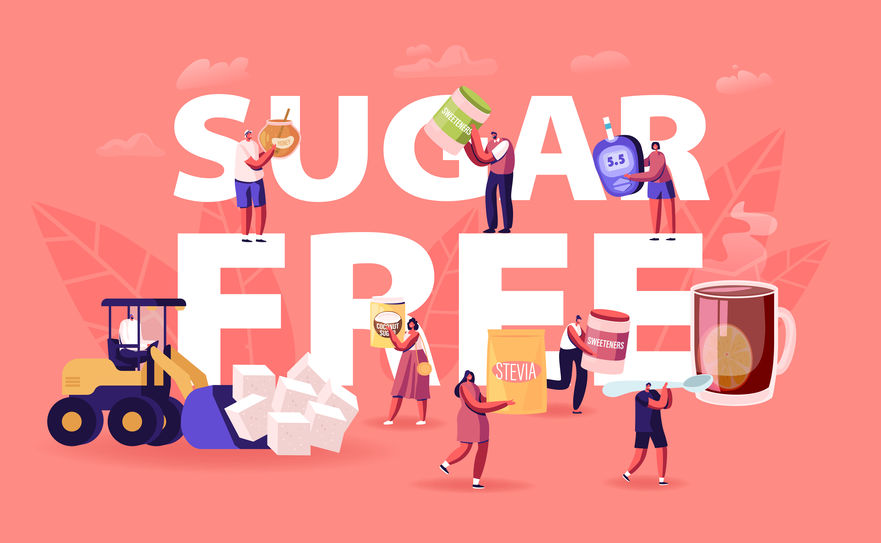Is there a link between sugar free drinks and heart disease? According to a new study, diet drinks boost risk of dangerous heart condition by 20%. Known as A-fib, atrial fibrillation is an irregular heartbeat often described by many people who have it as a “quiver,” “flutter” or “flip-flop” of the heart in the chest.
According to this study there is a link between drinking sugar free drinks and heart disease. Drinking two liters or more per week of artificially sweetened beverages — the equivalent of a medium-sized fast-food diet soda a day — raised the risk of an irregular heartbeat called atrial fibrillation by 20% when compared to people who drank none, a new study found.
Drinking a similar number of added-sugar beverages raised the risk of the condition by 10%, while drinking about four ounces of pure, unsweetened juices, such as orange or vegetable juice, was associated with an 8% lower risk of atrial fibrillation, the study found.
Sugar Free Drinks and Heart Disease
“This is the first study to report an association between no- and low-calorie sweeteners and also sugar-sweetened beverages and increased risk of atrial fibrillation,” said Penny Kris-Etherton, a professor emeritus of nutritional sciences at the Pennsylvania State University, in a statement. She was not involved in the new study.
While the study could only show an association between sweetened drinks and A-fib, the relationship remained after accounting for any genetic susceptibility to the condition. A 2017 study found people with European ancestry had about a 22% risk of inheriting the condition.
“We still need more research on these beverages to confirm these findings and to fully understand all the health consequences on heart disease and other health conditions,” said Kris-Etherton, who is also an American Heart Association nutrition committee member.
“In the meantime, water is the best choice, and, based on this study, no- and low-calorie sweetened beverages should be limited or avoided,” she added.
What is Atrial fibrillation?
• Atrial fibrillation is the leading cause of stroke in the United States. In addition, strokes connected to A-fib tend to be “more severe than strokes with other underlying causes,” according to the US Centers for Disease Control and Prevention.
• Atrial fibrillation can also lead to blood clots, heart failure and “can increase the risk for heart attack, for dementia, for kidney disease.
• All of those things are likely long term risks,” Dr. Gregory Marcus, professor of medicine at University of California, San Francisco School of Medicine and associate chief of cardiology for research at UCSF Health, told CNN in a prior interview.
Nearly 40 million people worldwide are living with atrial fibrillation, 6 million of those in the United States alone, according to the Heart Rhythm Society, who represents more than 7,000 specialists in cardiac rhythm disorders from more than 90 countries.
Many of those people suffer chest pain, palpitations, shortness of breath and fatigue. But for others, A-fib is symptomless, a potentially silent killer. Once detected, however, the condition can be treated with medications, lifestyle changes and if necessary, surgeries to slow or restore the heart’s normal rhythm.
The rate of atrial fibrillation in the US population is growing: The CDC estimates some 12 million Americans will have A-fib by 2030:
• “Age is one of the most important risk factors, so with the aging of the population it’s becoming more common,” Marcus said.
• The epidemic of obesity is also contributing to the growing numbers, along with other risk factors such as high blood pressure, diabetes, chronic kidney disease, smoking and drinking alcohol.
“Previous research has shown high soft drink consumption to be association with increased risk of AF (atrial fibrillation),” said Naveed Sattar, a professor of metabolic medicine at the University of Glasgow, Scotland, in a statement. He was not involved in the new study.
“Risk of AF is well known to be associated with type 2 diabetes, binge drinking of alcohol (commonly called holiday heart) as well as illicit drug use (cocaine),” Sattar said.
The study, published Tuesday in the journal Circulation: Arrhythmia and Electrophysiology, analyzed data on nearly 202,000 people participating in a large, biomedical database called the UK Biobank. Followed for an average of 10 years, people in the analysis ranged in age from 37 to 73 years old, and more than half were female.
Higher consumers of artificially sweetened beverages were more likely to be female, younger, weigh more and have a higher prevalence of type 2 diabetes, the study found. Those who drank more sugar-sweetened beverages were more likely to be male, younger, weigh more and have a higher prevalence of heart disease.
People who drank both sugar-sweetened beverages and pure juice were “more likely to have a higher intake of total sugar than those who drank artificially sweetened drinks,” according to the statement.
“Our study’s findings cannot definitively conclude that one beverage poses more health risk than another due to the complexity of our diets and because some people may drink more than one type of beverage,” said lead study author Dr. Ningjian Wang, a professor at the Shanghai Ninth People’s Hospital and Shanghai Jiao Tong University School of Medicine in Shanghai, China.
“However, based on these findings, we recommend that people reduce or even avoid artificially sweetened and sugar-sweetened beverages whenever possible,” Wang said in the statement. “Do not take it for granted that drinking low-sugar and low-calorie artificially sweetened beverages is healthy, it may pose potential health risks.”
Click here to learn more about sugar free drinks and heart disease.






